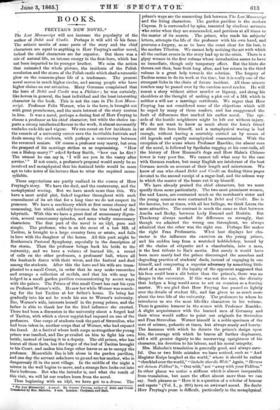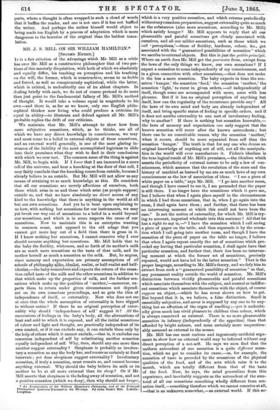BOOKS.
FREYTAG'S NEW NOVEL*
The Lost Manuscript will not increase the popularity of the author of Debit and Credit. Perhaps it will add to his fame. The artistic merits of some parts of the story and the chief characters are equal to anything in Herr Freytag's earlier novel, indeed the chief characters are far superior. But there was a stir of natural life, an intense energy in the first-born, which has not been imparted to its younger brother. We miss the action that animated the whole picture, the incidents of the Polish revolution and the storm of the Polish castle which shed a romantic glow on the common-place life of a tradesman. The present novel moves in much higher circles, and among people who have higher claims on our attention. Many Germans complained that the hero of Debit and Credit was a Philister ; he was certainly, like heroes in general, the least individual and the least interesting character in the book. This is not the case in The Lost Manu- script. Professor Felix Werner, who is the hero, is brought out with great prominence, and the main interest of the story centres in. him. It was a novel, perhaps a daring feat of Herr Freytag to choose a professor as his chief character, but while the choice im- parts a strong intellectual flavour to the work, it almost necessarily excludes rude life and vigour. We can count on few incidents in
the records of a university career save the inevitable festivals and duels among the students, with perhaps a controversy between the reverend seniors. Of course a professor may marry, but even the prospect of his marriage strikes us as unpromising. " How can a Bishop marry ?" asked Sydney Smith, " how can he ffirt? The utmost he can say is, ' I will see you in the vestry after service." If not comic, a professor's proposal would surely be so involved and metaphysical that his destined bride would be more apt to take notes of his lecture than to utter the required mono- syllable.
These expectations are partly realized in the course of Herr Freytag's story. We have the duel, and the controversy, and the metaphysical wooing. But we have much more than this. We have a most artful plot, linked together throughout with such concealment of its art that for a long time we do not suspect its presence. We have a machinery which at first seems clumsy and unmeaning, but which suddenly becomes the true thread of the labyrinth. With this we have a great deal of unnecessary digres- sion, several unnecessary episodes, and some wholly unnecessary characters. The first part of the novel is an idyl, pure and simple. The professor, who is on the scent of a lost MS. of Tacitus, is brought to a large country farm or estate, and falls in love with the daughter of the house. All this part might be Beethoven's Pastoral Symphony, especially in the description of the storm. Then the professor brings back his bride to the university, and we have a volume of learned life, a round of calls on the other professors, a professors' ball, where all the husbands dance with their wives, and the festival and duel among the students. After this the hero and his wife are trans- planted to a small Court, in order that he may make researches and arrange a collection of medals, and that his wife may be lodged in a small garden pavilion communicating by secret ways with the palace. The Prince of this small Court has cast his eyes on Professor Werner's wife. He saw her while Werner was search- ing for the lost Tacitus at her father's house. To bring her gradually into his net he sends his son to Werner's university. Ilse, Werner's wife, interests herself in the young prince, and the father is able to thank her for the kind influence she exerted.
There had been a discussion in the university about a forged leaf of Tacitus, with which a clever copyist had imposed on one of the professors. One corps of students took the part of Struvelius, who had been taken in, another corps that of Werner, who had exposed the fraud. At a festival where both corps met together the young prince was insulted, and use pr evailed on him to fight his own battle, instead of leaving it to a deputy. The old prince, who has learnt all these facts, has the forger of the leaf of Tacitus brought to his Court, and makes him forge other leaves so as to occupy the professor. Meanwhile Ilse is left alone in the garden pavilion, and one day the servant asks leave to go and see her mother, who is dangerously ill in the next village. In the middle of the night a mirror in the wall begins to move, and a strange face looks out into Ilse's bedroom. But who the intruder is, and what the result of this visit, we will let our readers learn from the novel.
Thus beginning with an idyl, we have got to a drame. The
The Lost M •t. . noveL By Gustav Freytag, author of Debit and Credit.
Trenigeted by Mn.a Malcolm. vols. London : Chapman and HaL
prince's ways are the connecting link between The Lost Manuscript and the living characters. The garden pavilion is the modern Capreae. It is surrounded by spies, tenanted by obedient servants who retire when they are commanded, and pervious at all times to the master of its secrets. _ The prince, who reads his subjects' letters, attempts the life of the professor with his own hand, and procures a forgery, so as to have the coast clear for his lust, is the modern Tiberius. We cannot help noticing the art with which all the earliest events in the story lead up to the crisis. There is a gipsy woman in the first volume whose introduction seems to have an immediate, though only temporary effect. But the hints she throws out then, bear fruit long after, and her return in the third volume is a great help towards the solution. The forgery of Tacitus seems to do its work at the time, but it is really one of the strongest links in the chain of future incident. All these minute touches may be passed over by the careless novel-reader. He will resent a story without either murder or bigamy, and shrug his 'shoulders at the thought of making a plot out of a MS. which is neither a will nor a marriage certificate. We regret that Herr Freytag has not considered some of the objections which will be urged by many of these readers, and has exaggerated the fault of diffuseness that marked his earlier novel. The epi- sode of the hostile neighbours might be left out without injury. We do not want to know as much about the hero's friend as about the hero himself, and a metaphysical wooing is bad enough, without having a courtship carried on by means of old legends and equally metaphysical commentaries. With the exception of the scene where Professor Reschke, the absent man of the novel, is followed by Speihahn tugging at his coat-tails, all the history of Herr Hummel's dogs and Herr Hahn's Chinese tower is very poor fun. We cannot tell what may be the case with German readers, but many English are intolerant of the best German novels on account of their length and minuteness. We know of one who closed Debit and Credit on finding three pages devoted to the annual receipt of a sugar-loaf, and the solemn way in which the master of the house cut it up himself.
We have already praised the chief characters, but we must specify them more particularly. The two most prominent womeu, Use and Laura, are contrasted much as the merchant's sister and the young countess were contrasted in Debit and Credit. Ilse is the heroine, but at times, with all her failings, we think Laura the more attractive. The contrast is much the same as that between Amelia and Becky, between Lady Esmond and Beatrix. But Thackeray always marked the difference so strongly, that though we admired the wrong one throughout, we always admitted that the other was the right one. Perhaps Ilse makes
the right Frau Professorin. What best displays her cha- racter is the influence she exercises on the young prince, and his sudden leap from a wretched hobbledehoy, bound by all the chains of etiquette and a chamberlain, into a man, is the best tribute to Use's merits. But surely it would have been more manly had the prince discouraged the senseless and degrading practice of students' duels, instead of engaging in one himself, and conquering a superior adversary by something little short of a marvel. If the loyalty of the opponent suggested that his face could bear a slit better than the prince's, there was no danger in the encounter. If this was not the case, the divinity that hedges a king would seem to act on occasion as a fencing master. We are glad that Herr Freytag has passed so lightly over the details of student life, and has given us so much more about the true life of the university. The professors to whom he introduces us are the most life-like characters in his volume. There is genuine humour in the scenes with Professor Reschke. A slight acquaintance with the learned men of Germany and their wives would suffice to point out originals for Struvelius and Frau Struvelius. Werner himself is a noble specimen of the man of science, pedantic at times, but always manly and hearty. The keenness with which he detects the prince's design upon him, the courage with which he braves all further displeasure, .add a still greater dignity to the unswerving uprightness of his character, his devotion to his labour, and his moral integrity.
Mrs. Malcolm's translation is generally good, and always care- ful. One or two little mistakes we have noticed, such as " And Magister Knips laughed at the world," where it should be rather " chuckled over the world," "lachelte iiber die Welt." Again, "Hera us mit deinem Plants" is, " Out with," not "away with your Fidibus." In other places we notice a stiffness which is almost inseparable from translation, but mars the effect almost more than we can say. Such phrases as " Here it is a question of a scholar of honour and repute" (Vol. I., p. 293) have an awkward sound. No doubt. Herr Freytag's prose is difficult, Particularly in the metaphysical
parts, where a thought is often wrapped in such a cloud of words that it baffles the reader, and one is not sure if it has not baffled the writer. And perhaps the author himself would object to being made too English by a process of adaptation which is more dangerous to the beauties of the original than the baldest trans- lation.































 Previous page
Previous page